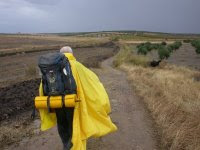Day 18, September 11: Hospital de Orbigo to Rabanal del Camino (37 km, 8:15)
It was cool and clear when I left at 6:45 am. Unfortunately the pain in my left leg started immediately, but it was manageable.
There was a fantastic view of Astorga and the mountains beyond, from the Crucero de Santo Toribio.
 Photo 562: Stone cross with Astorga in the background.
Photo 562: Stone cross with Astorga in the background.
Astorga is an important city as this is where the Camino Frances combines with the Camino via de la Plata that winds its way from Seville in the southern part of Spain (I’m considering walking this Camino in 2008). At one point in its history it had more than 20 albergues – only Burgos had more. When you walk the Camino, it is hard to get lost in the countryside, or in the small towns or the villages – the route is well marked. The cities, on the other hand, are more challenging. In Astorga the challenge was a weekly market in a square with a labyrinth of roads leading to and from it. The merchant’s stalls covered the route markings and in short order I was hopelessly lost.
 Photo 568: The market in Astorga where I got lost.
Photo 568: The market in Astorga where I got lost.
A friendly policeman pointed me in the right direction when I asked, “Donda est Camino?”
The albergue in Rabanal del Camino, Refugio Gaucelmo, was constructed of stone as is typical in the area.
 Photo 581: We slept in the little red-roofed stone building.
Photo 581: We slept in the little red-roofed stone building.
Markus and I combined our food resources with a young lady, Liz, from Seattle. Dinner consisted of bread, cheese, chorizo, sardines, tuna and a bottle of red wine. It was an impromptu dinner with great conversation and companionship.
 Photo 587: Dining with Liz and Markus.
Photo 587: Dining with Liz and Markus.
During the day's walk there were a number of memorable and interesting Camino markers (not all official!).
 Photo 559: An interesting cross as Villaus de Orbigo.
Photo 559: An interesting cross as Villaus de Orbigo.
 Photo 561: Someone went to a lot of effort here.
Photo 561: Someone went to a lot of effort here.
 Photo 577: More traditional markers.
Photo 577: More traditional markers.
 Photo 579: I saw this near Santa Catalina de Somoza. Compare the construction with the church steeple in the background.
Photo 579: I saw this near Santa Catalina de Somoza. Compare the construction with the church steeple in the background.
There was a fantastic view of Astorga and the mountains beyond, from the Crucero de Santo Toribio.
 Photo 562: Stone cross with Astorga in the background.
Photo 562: Stone cross with Astorga in the background.Astorga is an important city as this is where the Camino Frances combines with the Camino via de la Plata that winds its way from Seville in the southern part of Spain (I’m considering walking this Camino in 2008). At one point in its history it had more than 20 albergues – only Burgos had more. When you walk the Camino, it is hard to get lost in the countryside, or in the small towns or the villages – the route is well marked. The cities, on the other hand, are more challenging. In Astorga the challenge was a weekly market in a square with a labyrinth of roads leading to and from it. The merchant’s stalls covered the route markings and in short order I was hopelessly lost.
 Photo 568: The market in Astorga where I got lost.
Photo 568: The market in Astorga where I got lost.A friendly policeman pointed me in the right direction when I asked, “Donda est Camino?”
The albergue in Rabanal del Camino, Refugio Gaucelmo, was constructed of stone as is typical in the area.
 Photo 581: We slept in the little red-roofed stone building.
Photo 581: We slept in the little red-roofed stone building. Markus and I combined our food resources with a young lady, Liz, from Seattle. Dinner consisted of bread, cheese, chorizo, sardines, tuna and a bottle of red wine. It was an impromptu dinner with great conversation and companionship.
 Photo 587: Dining with Liz and Markus.
Photo 587: Dining with Liz and Markus. During the day's walk there were a number of memorable and interesting Camino markers (not all official!).
 Photo 559: An interesting cross as Villaus de Orbigo.
Photo 559: An interesting cross as Villaus de Orbigo. Photo 561: Someone went to a lot of effort here.
Photo 561: Someone went to a lot of effort here. Photo 577: More traditional markers.
Photo 577: More traditional markers. Photo 579: I saw this near Santa Catalina de Somoza. Compare the construction with the church steeple in the background.
Photo 579: I saw this near Santa Catalina de Somoza. Compare the construction with the church steeple in the background.


Comments